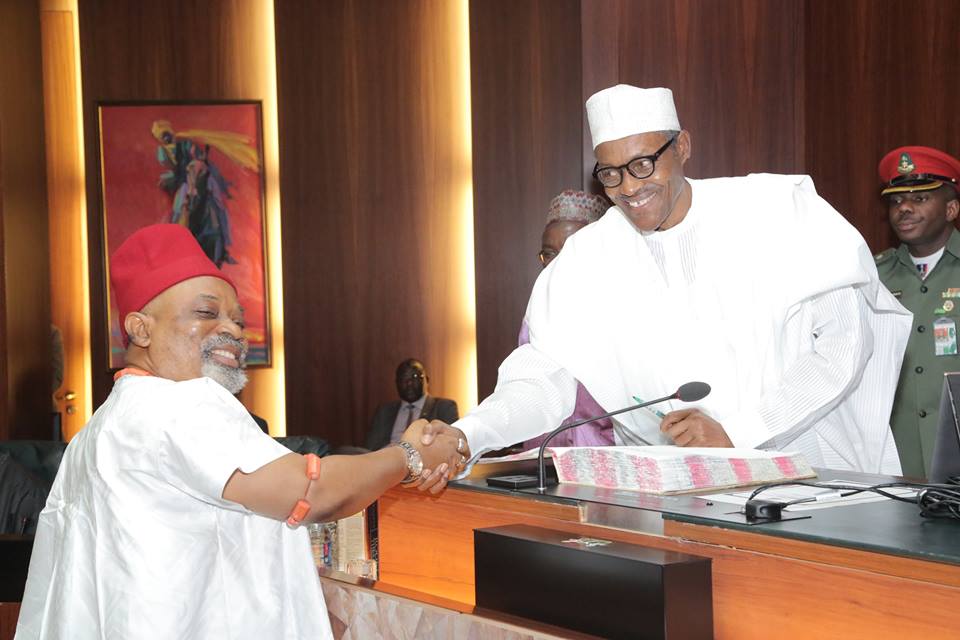- New Minimum Wage Implementation Begins Third Quarter – FG
The implementation of the new national minimum wage would commence in the third quarter of this year, the Federal Government announced on Monday.
According to the Minister of Labour and Employment, Chris Ngige, the negotiation committee for the new minimum wage for workers had received memoranda from all stakeholders involved in the process, adding that implementation should begin later this year.
Ngige spoke at the 40th anniversary celebration of the Nigeria Labour Congress in Abuja.
“Well, we all know the economic situation of the country as of today. The negotiation committee has members from all the tripartite bodies, which means the government cannot force its way. The committee has received memoranda from all the critical stakeholders and should begin the implementation of a new minimum wage in the third quarter of this year,” he said.
Early this month, the Federal Government had said it would prepare a supplementary budget to take care of workers’ demand for increase in salaries when the new minimum wage proposal was eventually approved.
The Director-General, Budget Office of the Federation, Ben Akabueze, had stated that the fact that there was no provision yet in the 2018 budget proposals currently before the National Assembly to cater for the planned increase did not, in any way, suggest that the government was not willing to increase the workers’ salaries.
The NLC had made a proposal for N56,000 for the least paid worker to the Federal Government’s committee on the minimum wage.
The 30-member committee headed by a former Head of Service of the Federation, Ms. Ama Pepple, was inaugurated in November last year by President Muhammadu Buhari.
Akabueze explained that when an agreement had been reached on the new minimum wage, the financial implications would be worked out and a supplementary budget would be prepared for its implementation.
In his address at the anniversary celebration, the President, NLC, Ayuba Wabba, warned those working against the realisation of the new minimum wage within the government that labour would resist their antics.
Meanwhile, the Speaker of the House of Representatives, Mr. Yakubu Dogara, said on Monday that lawmakers were prepared to support the payment of living wages to workers in the country.
He urged the NLC to continue its negotiations for living wages for workers as the labour body commemorated its 40th anniversary.
Dogara was quoted in a statement by his media office to have stated, “The major challenge facing the organised labour today is to negotiate a meaningful national minimum wage for Nigerian workers. I wish to lend the support of the House of Representatives to the ongoing efforts to secure not only a living wage for the Nigerian worker, but also to ensure that in retirement, workers are sufficiently taken care of.
“The labour of our heroes past shall never be in vain.”
In October 2017, members of the House called for a review of the current national minimum wage of N18,000 to N30,000.
They made the call while debating a motion on the urgent need for the Federal Government to intensify its wage review plans with labour in a bid to avoid a major nationwide industrial action.
The current minimum wage of N18,000 came into effect in 2011, but lawmakers said no Nigerian worker could survive on that.
The motion was moved by a former union leader, Mr. Peter Akpatason, a member of the All Progressives Congress from Edo State.
Akpatason had informed the House how the government appeared unwilling to push the wage review plans.
For instance, he said an agreement by the government and labour unions to begin the process was not being implemented.
During the October debate, lawmakers agreed that the N18,000 minimum wage was no longer realistic, suggesting at least N30,000 as the new minimum.
One of the members, Mrs. Ayo Omidiran, argued that a government that was committed to fighting corruption and crime should consider paying workers realistic wages a priority.
At Monday’s event, Wabba noted that the labour movement was ready to participate fully in Nigeria’s political activities in 2019, as it would resuscitate the Labour Party with a view to providing a veritable platform for labour activists to seek elective positions.
He said, “It was because of this understanding that we created the Labour Party. We are not yet disillusioned with developments within the party as we are mindful of the obvious fact that each organisation has its peak and low periods in its natural process of growth.
“We, therefore, call for unity of its members and urge all workers to register, claim it, control and have it as their party.”
The President, Trade Union Congress, Bobboi Kaigama, charged labour activists to develop more than an interest in politics, stressing that it was only when labour wrestle power from career politicians that it would be empowered to better the lots of the working masses.

 Forex4 weeks ago
Forex4 weeks ago
 Naira3 weeks ago
Naira3 weeks ago
 Billionaire Watch3 weeks ago
Billionaire Watch3 weeks ago



 Naira4 weeks ago
Naira4 weeks ago






 Naira3 weeks ago
Naira3 weeks ago


 Naira2 weeks ago
Naira2 weeks ago






 Naira2 weeks ago
Naira2 weeks ago


 Naira2 weeks ago
Naira2 weeks ago






















